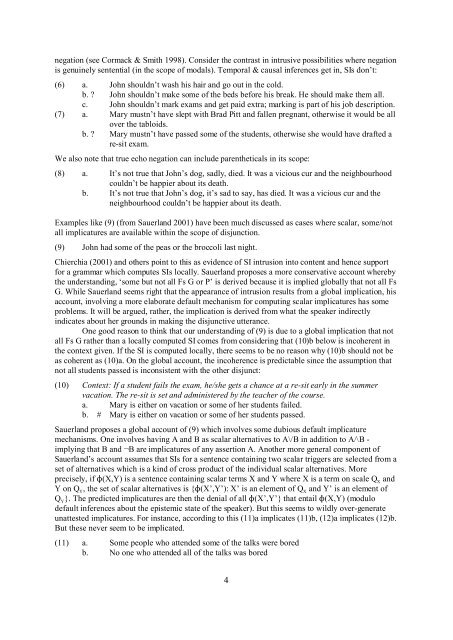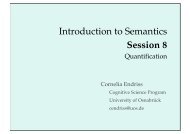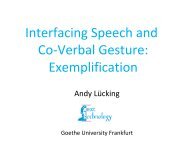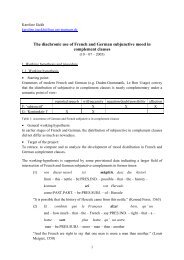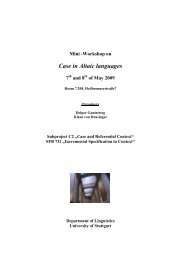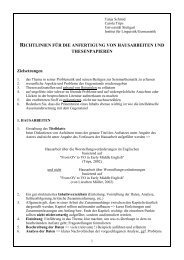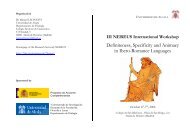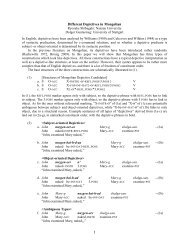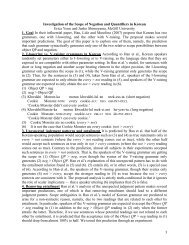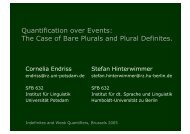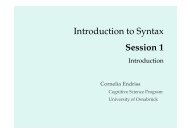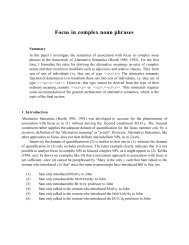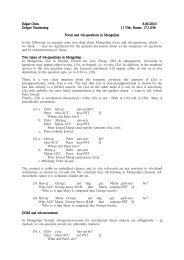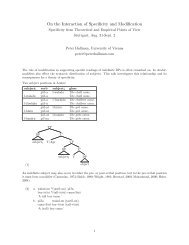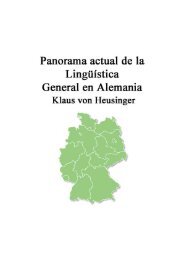SemPrag03.Progr.pdf - Institut für Linguistik/Germanistik - Universität ...
SemPrag03.Progr.pdf - Institut für Linguistik/Germanistik - Universität ...
SemPrag03.Progr.pdf - Institut für Linguistik/Germanistik - Universität ...
Create successful ePaper yourself
Turn your PDF publications into a flip-book with our unique Google optimized e-Paper software.
negation (see Cormack & Smith 1998). Consider the contrast in intrusive possibilities where negation<br />
is genuinely sentential (in the scope of modals). Temporal & causal inferences get in, SIs don’t:<br />
(6) a. John shouldn’t wash his hair and go out in the cold.<br />
b. ? John shouldn’t make some of the beds before his break. He should make them all.<br />
c. John shouldn’t mark exams and get paid extra; marking is part of his job description.<br />
(7) a. Mary mustn’t have slept with Brad Pitt and fallen pregnant, otherwise it would be all<br />
over the tabloids.<br />
b. ? Mary mustn’t have passed some of the students, otherwise she would have drafted a<br />
re-sit exam.<br />
We also note that true echo negation can include parentheticals in its scope:<br />
(8) a. It’s not true that John’s dog, sadly, died. It was a vicious cur and the neighbourhood<br />
couldn’t be happier about its death.<br />
b. It’s not true that John’s dog, it’s sad to say, has died. It was a vicious cur and the<br />
neighbourhood couldn’t be happier about its death.<br />
Examples like (9) (from Sauerland 2001) have been much discussed as cases where scalar, some/not<br />
all implicatures are available within the scope of disjunction.<br />
(9) John had some of the peas or the broccoli last night.<br />
Chierchia (2001) and others point to this as evidence of SI intrusion into content and hence support<br />
for a grammar which computes SIs locally. Sauerland proposes a more conservative account whereby<br />
the understanding, ‘some but not all Fs G or P’ is derived because it is implied globally that not all Fs<br />
G. While Sauerland seems right that the appearance of intrusion results from a global implication, his<br />
account, involving a more elaborate default mechanism for computing scalar implicatures has some<br />
problems. It will be argued, rather, the implication is derived from what the speaker indirectly<br />
indicates about her grounds in making the disjunctive utterance.<br />
One good reason to think that our understanding of (9) is due to a global implication that not<br />
all Fs G rather than a locally computed SI comes from considering that (10)b below is incoherent in<br />
the context given. If the SI is computed locally, there seems to be no reason why (10)b should not be<br />
as coherent as (10)a. On the global account, the incoherence is predictable since the assumption that<br />
not all students passed is inconsistent with the other disjunct:<br />
(10) Context: If a student fails the exam, he/she gets a chance at a re-sit early in the summer<br />
vacation. The re-sit is set and administered by the teacher of the course.<br />
a. Mary is either on vacation or some of her students failed.<br />
b. # Mary is either on vacation or some of her students passed.<br />
Sauerland proposes a global account of (9) which involves some dubious default implicature<br />
mechanisms. One involves having A and B as scalar alternatives to AB in addition to AB -<br />
implying that B and ¬B are implicatures of any assertion A. Another more general component of<br />
Sauerland’s account assumes that SIs for a sentence containing two scalar triggers are selected from a<br />
set of alternatives which is a kind of cross product of the individual scalar alternatives. More<br />
precisely, if (X,Y) is a sentence containing scalar terms X and Y where X is a term on scale Q X and<br />
Y on Q Y , the set of scalar alternatives is {(X’,Y’): X’ is an element of Q X and Y’ is an element of<br />
Q Y }. The predicted implicatures are then the denial of all (X’,Y’} that entail (X,Y) (modulo<br />
default inferences about the epistemic state of the speaker). But this seems to wildly over-generate<br />
unattested implicatures. For instance, according to this (11)a implicates (11)b, (12)a implicates (12)b.<br />
But these never seem to be implicated.<br />
(11) a. Some people who attended some of the talks were bored<br />
b. No one who attended all of the talks was bored<br />
4


